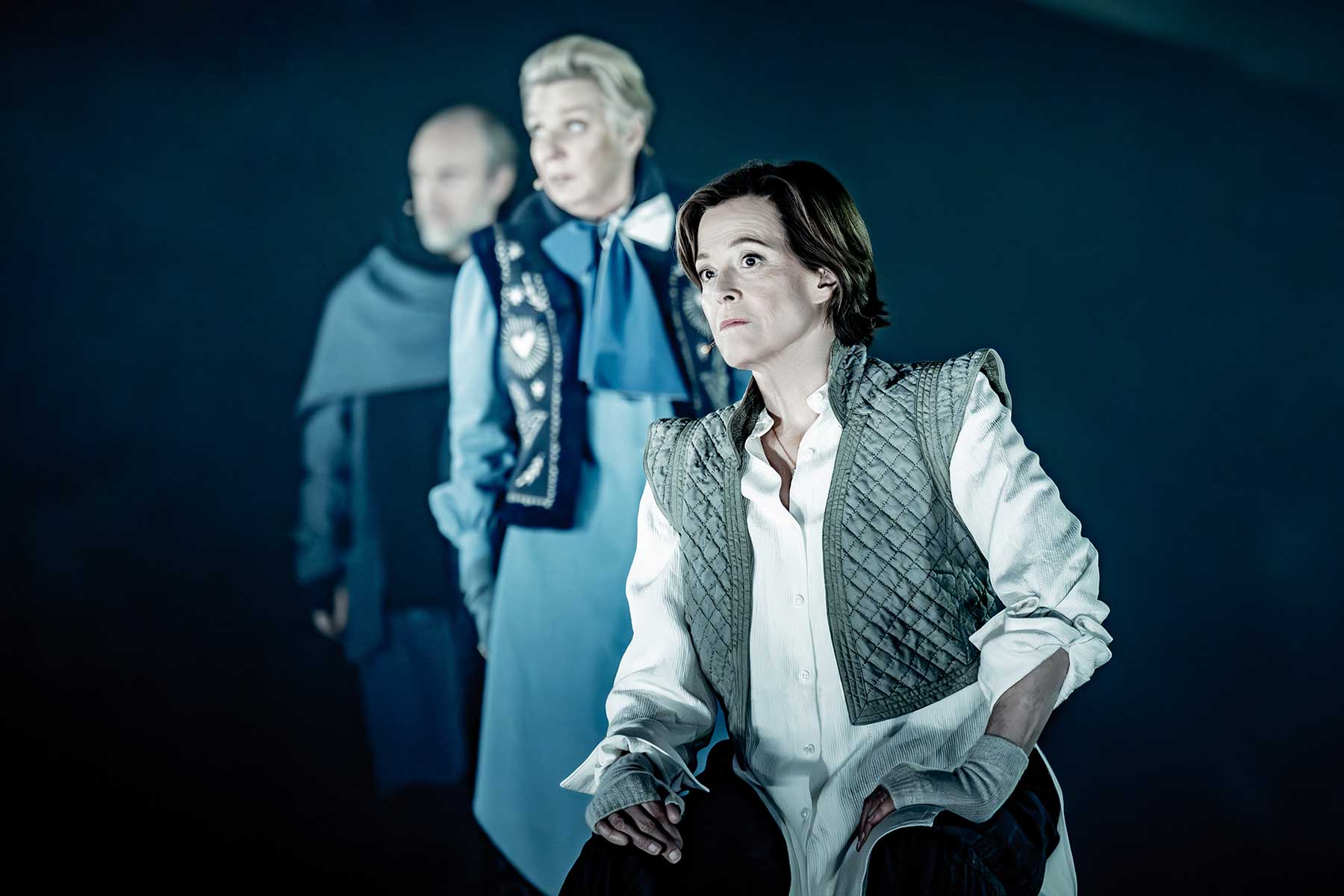
Jamie Lloyd‘s revival of The Tempest at Theatre Royal Drury Lane offers moments of brilliance but feels weighed down by its inconsistencies. I’ve been a fan of Sigourney Weaver since Working Girl, and I was rooting for her West End debut as Prospero. I wasn’t alone; you could feel a groundswell of goodwill towards her in the Lane that night. Unfortunately, it wasn’t enough. Weaver’s Prospero reflects a dearth of emotional resonance that haunts the entire production, with a shaky start from which it never recovers. A phenomenal Mason Alexander Park as Ariel cannot save it.
Sigourney Weaver is undeniable in her command of the stage. Her charisma, warmth, and statuesque presence are ever felt but not used to any effect. Prospero’s interactions with other characters, notably Miranda and Ariel, feel perfunctory, failing to uncover the layers of vulnerability and depth the role demands. Prospero meanders and sits, communicating nothing at all; Weaver is almost spectral, hovering over proceedings rather than commanding them. But this is the great Prospero, a usurped, raging royal who has mastered control of nature. In this gender-bended casting, however, Lloyd seems to perceive a female Prospero as omnipresent but passive instead of embracing the fierce omnipotence of a true Mother Nature.
Mason Alexander Park as Ariel is the singular element of this production, and when it caters to their performance, its potential is realised. The sound design, by Ben and Max Ringham, was most effective when opening up to serve their booming and beautiful voice as they entered and withdrew. The central theme of duality between nature and nurture in The Tempest is best brought out by Park‘s Ariel; they are savage, discerning, authentic, and intangible, bringing both gravitas and delicateness. Billowing, dark fabrics and drapes, part of Soutra Gilmour‘s striking set design, sweep across the barren stage, mirroring Ariel’s fluidity in both their movement and gender expression.
The character of Ariel has been interpreted as genderless or trans before, but Lloyd and Park’s work here made me question how this character could ever be performed by someone locked into a gender binary again. Park’s Ariel transcends contrivances and superficial gender subversions, like Prospero, fully realising the power of reimagining gender necessary for something as fantastical as The Tempest.
“Jamie Lloyd‘s revival of The Tempest at Theatre Royal Drury Lane offers moments of brilliance but feels weighed down by its inconsistencies”
Beyond Park, however, this was a painfully inert production. Miranda and Ferdinand were often isolated, squatting and hovering on disparate parts of the stage. It successfully underscored the remoteness and disaster of the shipwreck but also rendered them as extras, despite strong performances, particularly from Mara Huf. Most unforgivable was how Lloyd put Baby in the proverbial corner; Weaver’s physicality has placed her among the greatest action performers of the last 40 years. Lloyd has got Ripley sitting on a stone for two hours! Combined with how demonstrably stuck some of the principal cast appeared with the language, this stasis made for a stodginess that completely undercuts the production’s potential for wonder.
Sarah Cadell demonstrated a comfort with the text that was absent among other key cast members. Every time she was on stage, the production felt more anchored in reality, however surreal the themes and ideas. On the other hand, Forbes Masson’s Caliban left me at a loss. This is not to discredit Masson, who threw his heart into the performance rather, Lloyd’s interpretation of Caliban was confounding. While contemporary productions have explored Caliban as a post-colonial figure—a lens that feels particularly relevant—this production leaned into neither that nor anything else. Caliban remains one of Shakespeare’s most compelling and relevant characterisations, and the lack of coherence here was a disappointment.
It is hard for me not to compare The Tempest with the recently wrapped revival of Coriolanus at the National, and the former fares unfavourably. Unlike the stodginess here, Coriolanus incorporated choreography that lent time and fluidity to the storytelling while also offering mastery in emotional resonance and textual confidence. David Oyelowo’s classical training helped tremendously. Some of the most exciting Shakespearean performances I’ve seen have (thankfully) abandoned Received Pronunciation in favour of rhythmic dialects from Lagos or the drawl of the Deep South.
So, Weaver’s American accent is not an issue. But there is something to be said for classically trained actors who are able to ride the pace, complexity, beauty and provocation of Shakespeare’s wordplay. It provides the confidence and freedom required for them to draw out the emotion. Here, several cast members were labouring in the language, and as a result, the production did not achieve either the poetry or the emotional depth.
At its best, The Tempest should be an exploration of the heart and head, a blank canvas for the fantastical with an authentic emotional centre. Sadly, Park’s Ariel was the only part that captured this spirit. While visually arresting at times, Jamie Lloyd’s minimalist staging lacked the dynamism to fully scaffold the Bard’s intricate language. It’s static nature, combined with an ensemble often weighed down by the text, kept it from plunging the emotional and magical depths of Shakespeare’s final play.
Need to know: The Tempest plays at Theatre Royal Drury Lane until 1 Feb 2025





























